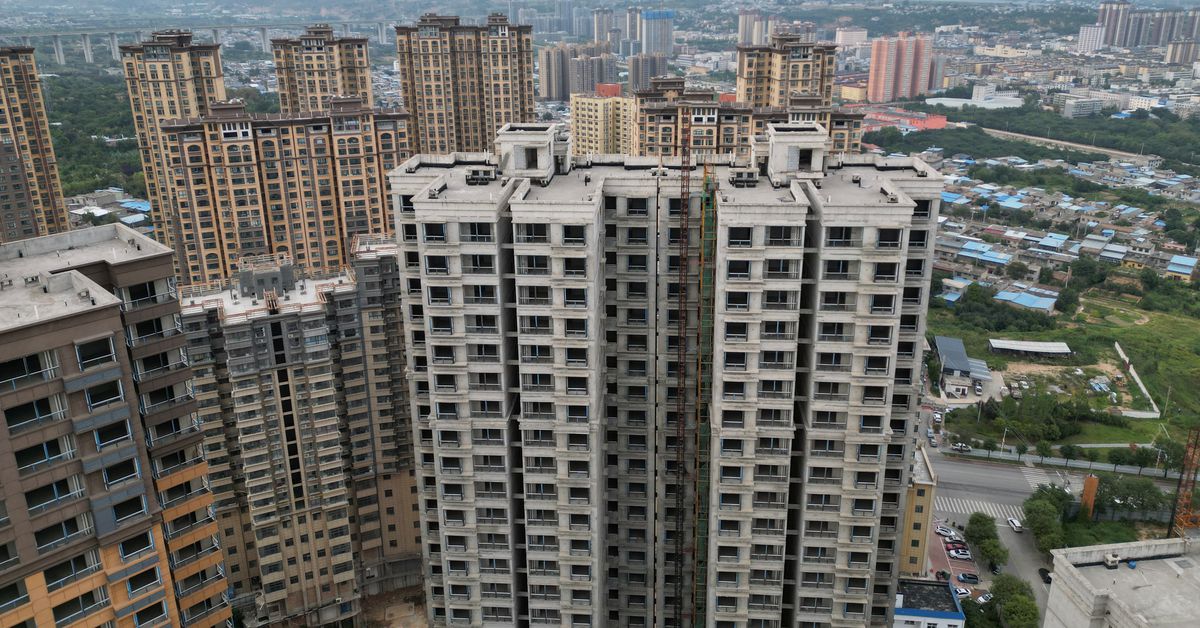Even China’s population of 1.4 billion would not be enough to fill all the empty apartments littered across the country, a former official said on Saturday, in a rare public critique of the country’s crisis-hit property market.
China’s property sector, once the pillar of the economy, has slumped since 2021 when real estate giant China Evergrande Group (3333.HK) defaulted on its debt obligations following a clampdown on new borrowing.
Big-name developers such as Country Garden Holdings (2007.HK) continue to teeter close to default even to this day, keeping home-buyer sentiment depressed.
As of the end of August, the combined floor area of unsold homes stood at 648 million square metres (7 billion square feet), the latest data from the National Bureau of Statistics (NBS) show.
That would be equal to 7.2 million homes, according to Reuters calculations, based on the average home size of 90 square metres.
I find it interesting that everyone is calling this bad management when it’s indicating one thing above all:
Productivity has well exceeded the requirements of the population.
People simply don’t need to work that hard anymore, but all industrialized societies, even would-be socialists, simply can’t stand the idea of letting the working class have leisure time.
Maybe if they actually built these things up to code it would take longer to build them in the first place. These things tend to collapse.
If one crumbles, they can just use the one next door. They have a surplus! /s
That may have been true if this resulted from the operation of a non corrupt free market, but this is instead China.
Is China having a homelessness crisis, economic collapse, or famine?
Yes.
Source?
The world is really lucky that China’s not doing that great at the moment. Not so long ago, China was winning the propaganda war internationally.
You don’t want authoritarianism to win the argument by out-performing democracies.
I agree. I don’t think we had or have anything to fear. The Chinese educational system is built around obedience, cultural homogeneity, and rote learning. Sure, there are fewer protests, and there is less crime, but also a SEVERE lack of innovation. I can count on one hand the number of innovations China has exported to the world in the last decade. Everything they build of note is based on stolen IP and figurative and literal slave labour. The world is finally clamping down on the former, and China’s social progression to a service-based economy is putting an end to the latter. Their comparative competitive advantages are eroding by the day.
and there is less crime
I wouldn’t necessarily bet on this, authoritarian states are breeding grounds for corruption and that in turn fuels crime. I wouldn’t be surprised if China has a problem with criminality that the government, at least on a local level, not only turns a blind eye to but is complicit in.
I suspect a major reason for Putin’s most recent crimes was to prevent his people learning how much their neighbours are prospering.
Why doesn’t China count as a democracy? People vote and the votes get counted and decide who runs things.
Why doesn’t North Korea count as a democracy? People vote and the votes get counted and decide who runs things. /s
Hmm, why isn’t the one-party state is considered a democracy? Truly baffling.
Why do you think voting for party is the only form of democracy?
Why don’t you?
why dont we want that if its outperforming democracies
Ah the old “ends justify the means” argument. I’ve seen this one before somewhere
“the means”, of course, being out-performing democracies
“the means” in this case would be authoritarian repression.
“The means” always has to be something bad for the “ends” to try and justify reaching for “the means”.
Can you give a briefer on how it’s outperforming democracies? I don’t mean to be confrontational, I really want to hear why you think that.
i dont have a briefer on how its outperforming democracies, im not the one that came up with that premise
Wait, what? But you said:
why dont we want that if its outperforming democracies
“the means”, of course, being out-performing democracies
I’m missing something here
hyperreality said
You don’t want authoritarianism to win the argument by out-performing democracies.
i argued based on that premise
you can tell because of the use of the word “if” in this sentence
why dont we want that >if< its outperforming democracies
if that premise was nonsense from the start they probably shouldnt have run an argument off it
Show me a single democracy anywhere in the world.
Alright I’ll bite, what makes the world’s declared democracies actually undemocratic in your mind?
Billionaires directly or indirectly buying elections, politicians, drafting policies, funding propaganda, regulatory capture, etc.
The democratic world doesn’t start and end with America
I live in Denmark. All liberal democracies are subject to the whims of billionaires.
Edit: oh wait, you’re Canadian. That’s fucking hilarious.
deleted by creator
Its a democracy when you’re in the global north, it’s autocracy when you’re in the global south.
I love how you’re getting downvoted, likely by people who feel a sense of enlightenment in that they can identify Chinese propaganda that has been pointed out to them as such but have no clue about propaganda originating from their own country or from a country theirs is allied with.
I live in Scandinavia. Please enlighten me about my country’s propaganda
CEPOS
Scandinavia is a country?
According to the Danes, definitely.
Ironically, founded to “stop the encroachment by the Germans” the Kalmar union first had a Pommeranian King, and then a Saxon one.
Considering China’s population shrank by nearly 1 million last year and it predicted to drop by ~700 million by 2100.
This is not going to get better.
When you make the only safe place for money real estate, then your corrupt Politicians make that only safe for the wealthy and connected, you end up with a lot of empty useless real estate.
Are you talking about China or Toronto?
Yes
Toronto is arguably an exclave of China. One could argue that Canada is now a colony of the PRC.
Damn… Can’t they disassemble them and ship them in the West?
No thanks, China’s infrastructure is of notoriously bad quality.
You’re thinking of Ikea
We can exchange them for a wobbly CD rack and some of those rancid meatballs.
If you’re American, the problem here actually isn’t the number of residences, there are plenty of those. The problem is that developers only want to invest in single family units or high value apartments. We need policy makers who will actually tax absentee landlords and developers of high value properties to the point that local developers begin seeing more profit in creating affordable housing. In fact, affordable housing can be some of the most profitable even without increased tax burden but try convincing a group of investors that.
The West is not interested in more houses.
For many mainland Chinese people, real estate is the only place they can invest their money. Traditionally and culturally it’s also seen as the only possible way to rise up and do better.
The money export controls make it difficult for the average guy to move his money abroad as well.
So there are many Chinese people putting retirement or family savings into these places because they don’t have other options.
They have also just had a very long run of easy government backed mortgage support, making it a bit too easy to borrow money for these properties.
It’s crazy and doesn’t make long term sense when the number of domiciles exceeds the number of people.
Wait so China might be having an economic crisis in coming years?
A lot of signs point to it already beginning.
This is a quick reminder that (looking at you fellow Americans) authoritarian governments are incredibly inefficient economically at best, are always ran by idiots, and are completely detrimental to everything at worst.
This is important, not least because making the cement and steel for these surplus apartments and associated road infrastructure makes an enormous contribution to global CO2 emissions. Look at how the emissions took off after 2005. So the sooner the bubble bursts, the better for the climate.
And China’s population is projected to fall under 1 billion again over the next decades, making this a shit show circus. So many apartments bought as an investment will never see any occupancy and will likely just be abandoned. They got entire empty ghost towns already
This is the best summary I could come up with:
BEIJING, Sept 23 (Reuters) - Even China’s population of 1.4 billion would not be enough to fill all the empty apartments littered across the country, a former official said on Saturday, in a rare public critique of the country’s crisis-hit property market.
Big-name developers such as Country Garden Holdings (2007.HK) continue to teeter close to default even to this day, keeping home-buyer sentiment depressed.
As of the end of August, the combined floor area of unsold homes stood at 648 million square metres (7 billion square feet), the latest data from the National Bureau of Statistics (NBS) show.
That does not count the numerous residential projects that have already been sold but not yet completed due to cash-flow problems, or the multiple homes purchased by speculators in the last market upturn in 2016 that remain vacant, which together make up the bulk of unused space, experts estimate.
“That estimate might be a bit much, but 1.4 billion people probably can’t fill them,” He said at a forum in the southern Chinese city Dongguan, according to a video released by the official media China News Service.
His negative view of the economically significant sector at a public forum stands in sharp contrast to the official narrative that the Chinese economy is “resilient”.
The original article contains 346 words, the summary contains 211 words. Saved 39%. I’m a bot and I’m open source!
It’s not for them. It’s so they can buy them and charge exorbitant rents to the next generation looking for a place to call their own, but can’t afford one of their own.
There is no next generation to rent them to…China’s population is shrinking.
Doubt they have that multi-generational 4D chess in mind
Nah. China’s urbanization rate is currently 65%. South Korea for comparison has 82% urbanization rate. So the Chinese have plenty more (say, a hundred million or so more) homes to build. The current difficulties are more to do with (i) loss of consumer confidence caused by the leadership’s bad economic management, and (ii) the deliberate restriction of credit to developers because of the government’s concerns about debt.
This analysis reminds me of the hoo-hah about China’s “ghost cities” circa 2010. Those ghost cities ended up being filled up.
There are still vast ghost cities in that country, so no they don’t actually all fill up
Sooo many empty or partially used shopping malls
Enough of them filled up that even the press outlets that pushed the ghost cities narrative most aggressively, like Bloomberg, have run follow-up stories acknowledging it.
Yes, some developments worked out and others didn’t, but building out housing in advance of increasing urbanization is a good thing, not a bad thing. It’s how you avoid housing unaffordability in urban centers, or worse, the rise of slums.
Building housing 15 or 20 years ahead of time isn’t a good thing. When people move in, the places are already old. Apartment buildings deteriorate over time even with no one living in them. It’s clearly wasteful to build them that early and there’s definitely a huge property bubble in China.
It’s not 15 or 20 years ahead of time, though. The “ghost cities” came alive within only a few years; for example, this page points to Zhengdong New District, which was singled out as a ghost city by 60 Minutes in 2013. It had a population of 5 million seven years later. For district development (as opposed to constructing a single building), seven years is nothing.
Coming back to their current property crisis: let’s assume the article is correct that there’s an excess of 7 million homes. We can plug this into China’s current urbanization rate, and suppose China will get to South Korea’s urbanization rate in 20 years (that’s roughly how far they’re behind SK, by GDP per capita). At one home for every 3.5 people, they need 3.4 million homes per year on average. So they have overshot by about 2 years, which is hardly going to make buildings crumble.
Ghost cities are largely American propaganda and most have filled out to well urbanized areas.
Propaganda implies a concerted and deliberate effort. Even your source labels it as media misinformation stemming from gawking curtiosity.
if only their regime weren’t so repressive, homeless americans would be flocking there for a place to live.
I’m guessing most of those dwellings are in places that don’t have any employment options.
presumably someone is doing upkeep on these buildings, and presumably those someones have needs for other folks to fill
presumably once more folks move there, they will have even more needs for folks to fill
not to mention remote work and all that
perhaps not, but hey, if a job around here won’t make it possible for you to afford four walls and a roof, then the difference it purely academic.
People like to create things, to do something productive. it’s why NEETs are notoriously miserable people who hate themselves. humans crave to DO something or it torments us to the brink of suicide - and sometimes past it. If only these folks had a place to live and weren’t brutalized by the authorities for daring to attempt to do so, they’ll create productive activities.
Part of the problem of poverty here, also, is that it’s sometimes literally fucking illegal to carry out productive labor activities unless you’re on land that you own or land that is owned by a designated employer. Try growing produce in a vacant lot and you’ll get arrested for trespassing and “vandalism”, and possibly sued by whatever ghoulish real estate holdings firm is hoarding the land.
With an apartment and nothing else, you’ll have a place to go back to while seeking employment OR a place to stage activities with other people. just because I personally don’t have 100% of the answers or the clairvoyant foreknowledge of what someone might be able to do with the resource of just having a space to call their own doesn’t mean that someone else won’t come up with something i’d have never dreamed of. I think it’s not unreasonable to have a little faith in human creativity.











